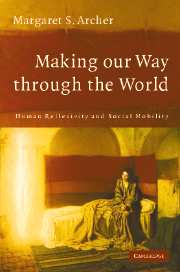Conclusion: reflexivity's future
Published online by Cambridge University Press: 04 December 2009
Summary
How we make our way through the world by using the human power of reflexivity also contributes to the remaking of our social world. It is to the latter that this brief conclusion is devoted. When ‘Reflexivity's biographies’ were discussed, three alternative and incompatible accounts were presented, but they had one feature in common: all three dealt quite simply with the extent of reflexivity (seemingly) required in the past, in recent times and – speculatively – in the future. However, if the arguments and evidence presented in the foregoing chapters carry conviction, the discussion can now be refined to deal with the distribution and consequences of different modes of reflexivity in modernity and in nascent globalisation.
There seems no compelling reason to conclude that any of the three modes of internal conversation, which have been identified and investigated in this contemporary study, were absent in the past. Both biblical and classical sources yield illustrations indicating that the modes of reflexivity discussed throughout this book were practised and recognised in those times, albeit under different descriptions. It might be objected that such exemplifications include myths, midrash and redactions. At any rate, we can agree they are not interview transcripts. If, for the sake of argument, the entire biblical canon and classical corpus are regarded as ‘stories’ from times well past – perhaps not from their purported dates – the fact remains that their authors not only conceived of such mental activities but also wrote about them in the belief that they would be understandable to their readers.
- Type
- Chapter
- Information
- Making our Way through the WorldHuman Reflexivity and Social Mobility, pp. 314 - 325Publisher: Cambridge University PressPrint publication year: 2007



